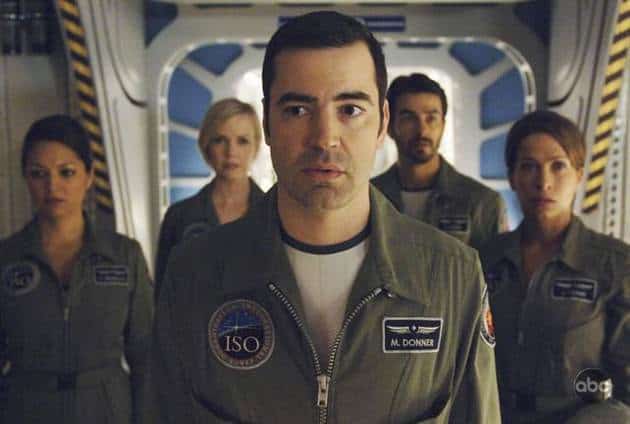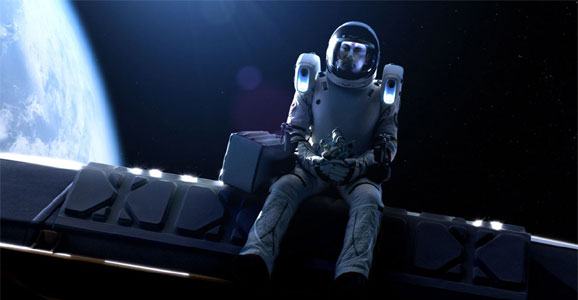Someday, probably far off in the future, science will
discover a verifiable, reproducible explanation for why it is that people like
me willingly subject ourselves to the torture of watching television shows that
are smart and cutting-edge and challenging and thus have no hope of surviving
the season on network TV. Sadly, that day has not yet arrived and thus I am
still living with Cancelitis.
My latest flare-up comes in the form of a multi-nationally
produced sci-fi drama that actually leaned much harder on the “sci” than the “fi”
called Defying Gravity. The 2009 show
about a manned space mission to explore the solar system was a joint project
between ABC in America and CTV in Canada. It was notable for featuring a
multi-national cast playing multi-national characters.
Sickness Ahoy!
The Plot: About 70 years in the future, eight astronauts,
four men and four women, board the Antares
for a six-year cruise to visit Venus, Mercury, Mars, Jupiter, Europa, Saturn
and Pluto. The show alternates between the astronauts in space and Mission
Control back in Houston. Conflict comes from mysterious happenings that begin
on the ship and the fact that select members of the Mission Control team seem
to have a darker plan for the mission than they’re letting on. Meanwhile,
characters who don’t always get along with each other are literally forced to
live and work (and, let’s be honest, have sex) with each other.
And while the interpersonal tension is a major plot point,
before long the astronauts are facing strange occurrences, some frightening,
some awe-inspiring, tied to some kind of mysterious cargo being stored on the
ship. Referred to only as “Beta” by the Earth-bound Mission Control, Beta is
mucking about with the mission, literally altering the astronauts on a cellular
level and causing them to come face-to-face with events from their own pasts. As
Antares moves further away from
Earth, the astronauts become more isolated and more fragile while Beta becomes more
prominent and possibly more dangerous.
"If anyone gets a vaguely chest-bursting feeling during dinner, I'm turning this spaceship around."
Comparisons to other shows flew pretty fast and loose
while Defying Gravity was on the air.
Critics found it to be equal parts Lost,
Babylon 5 and even Grey’s Anatomy, although in my opinion
that last one is a bit out of left field. The show placed a high premium on
telling a very modern story about science – about the only sign that this show
couldn’t be set today is the show’s in-universe explanation for artificial
gravity to explain why the actors don’t spend all their scenes floating – but one
that would still, at its core, have a much more, ahem, alien driver.
Defying Gravity
definitely had its weak points – like many first season shows, the writing
started off clunky with some odd characterization and awkward dialogue while
the writers got a better sense of who these characters were. Ironically, for a
sci-fi show at least, one aspect that the show didn’t lack for was effects.
Because the show was so grounded (if you’ll pardon the pun) in reality, there’s
no beaming down to the planet, no faster-than-light travel, none of the typical
sci-fi tropes that, in addition to putting a further barrier between the show
and the viewer, also jack up the costs of filming. The ship, Antares, is much more akin to the
present day International Space Station than it is to the starship Enterprise. The sets were built to look
technical and modern, not glamorous and sleek. The computer and launch technology
in particular, while cutting edge, wouldn’t be that out of place in any
high-tech thriller set in today’s time.
It goes without saying that this show did not last long.
For a grand total of only 13 episodes, viewers at least got the first full
season, but like so many that went before it, we never got to see the
resolution of all the mysteries. Unlike other “brilliant but cancelled” shows, however,
Defying Gravity did actually get an
ending! Sort of… Once it was confirmed that the show would not be coming back,
creator James Parriott released highlights from the show’s Bible, including
details about what each mystery for each main character meant and what was
planned for them for the remaining years of their mission. Reading it points to
one of the crucial lessons that sci-fi shows need to learn: never put all your
cool set pieces in the third season. Defying
Gravity learned that partway, so while there were plenty of storylines left
floating about (sorry, I seem to be overly pun-y today), watching the entire
series at least gives you some of the answers you wanted. All of which makes
reading about where the show would have gone that much more frustrating because
you can see how cool the final story would have been.
"No, it's cool. You can cancel us. I'll just wait here for the next smart science show to come along. Should arrive any minute now."
For a space opera that’s light on the opera, do yourself
a favor and check out Defying Gravity.




2 comments:
Why is it I have never heard of this show??
Likely because the network spent somewhere around $1.53 to promote it. It died on the table mostly just because no one knew what it was, I think. I heard about it due to a blog that I read at the time and just put it on my Netflix queue. Definitely recommended, though!
Post a Comment